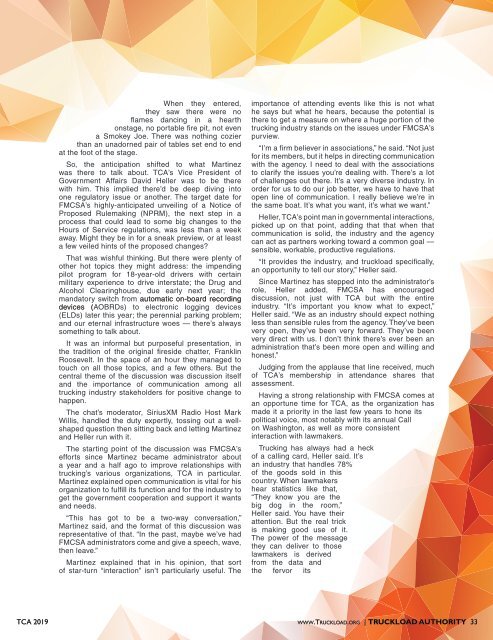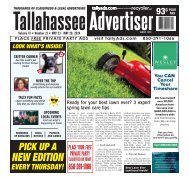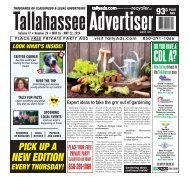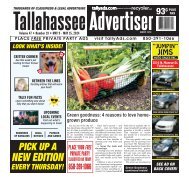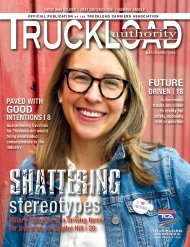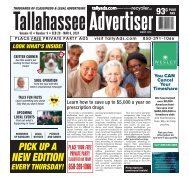TLA37_AllPages
You also want an ePaper? Increase the reach of your titles
YUMPU automatically turns print PDFs into web optimized ePapers that Google loves.
When they entered,<br />
they saw there were no<br />
flames dancing in a hearth<br />
onstage, no portable fire pit, not even<br />
a Smokey Joe. There was nothing cozier<br />
than an unadorned pair of tables set end to end<br />
at the foot of the stage.<br />
So, the anticipation shifted to what Martinez<br />
was there to talk about. TCA’s Vice President of<br />
Government Affairs David Heller was to be there<br />
with him. This implied there’d be deep diving into<br />
one regulatory issue or another. The target date for<br />
FMCSA’s highly-anticipated unveiling of a Notice of<br />
Proposed Rulemaking (NPRM), the next step in a<br />
process that could lead to some big changes to the<br />
Hours of Service regulations, was less than a week<br />
away. Might they be in for a sneak preview, or at least<br />
a few veiled hints of the proposed changes?<br />
That was wishful thinking. But there were plenty of<br />
other hot topics they might address: the impending<br />
pilot program for 18-year-old drivers with certain<br />
military experience to drive interstate; the Drug and<br />
Alcohol Clearinghouse, due early next year; the<br />
mandatory switch from automatic on-board recording<br />
devices (AOBRDs) to electronic logging devices<br />
(ELDs) later this year; the perennial parking problem;<br />
and our eternal infrastructure woes — there’s always<br />
something to talk about.<br />
It was an informal but purposeful presentation, in<br />
the tradition of the original fireside chatter, Franklin<br />
Roosevelt. In the space of an hour they managed to<br />
touch on all those topics, and a few others. But the<br />
central theme of the discussion was discussion itself<br />
and the importance of communication among all<br />
trucking industry stakeholders for positive change to<br />
happen.<br />
The chat’s moderator, SiriusXM Radio Host Mark<br />
Willis, handled the duty expertly, tossing out a wellshaped<br />
question then sitting back and letting Martinez<br />
and Heller run with it.<br />
The starting point of the discussion was FMCSA’s<br />
efforts since Martinez became administrator about<br />
a year and a half ago to improve relationships with<br />
trucking’s various organizations, TCA in particular.<br />
Martinez explained open communication is vital for his<br />
organization to fulfill its function and for the industry to<br />
get the government cooperation and support it wants<br />
and needs.<br />
“This has got to be a two-way conversation,”<br />
Martinez said, and the format of this discussion was<br />
representative of that. “In the past, maybe we’ve had<br />
FMCSA administrators come and give a speech, wave,<br />
then leave.”<br />
Martinez explained that in his opinion, that sort<br />
of star-turn “interaction” isn’t particularly useful. The<br />
importance of attending events like this is not what<br />
he says but what he hears, because the potential is<br />
there to get a measure on where a huge portion of the<br />
trucking industry stands on the issues under FMCSA’s<br />
purview.<br />
“I’m a firm believer in associations,” he said. “Not just<br />
for its members, but it helps in directing communication<br />
with the agency. I need to deal with the associations<br />
to clarify the issues you’re dealing with. There’s a lot<br />
of challenges out there. It’s a very diverse industry. In<br />
order for us to do our job better, we have to have that<br />
open line of communication. I really believe we’re in<br />
the same boat. It’s what you want, it’s what we want.”<br />
Heller, TCA’s point man in governmental interactions,<br />
picked up on that point, adding that that when that<br />
communication is solid, the industry and the agency<br />
can act as partners working toward a common goal —<br />
sensible, workable, productive regulations.<br />
“It provides the industry, and truckload specifically,<br />
an opportunity to tell our story,” Heller said.<br />
Since Martinez has stepped into the administrator’s<br />
role, Heller added, FMCSA has encouraged<br />
discussion, not just with TCA but with the entire<br />
industry. “It’s important you know what to expect,”<br />
Heller said. “We as an industry should expect nothing<br />
less than sensible rules from the agency. They’ve been<br />
very open, they’ve been very forward. They’ve been<br />
very direct with us. I don’t think there’s ever been an<br />
administration that’s been more open and willing and<br />
honest.”<br />
Judging from the applause that line received, much<br />
of TCA’s membership in attendance shares that<br />
assessment.<br />
Having a strong relationship with FMCSA comes at<br />
an opportune time for TCA, as the organization has<br />
made it a priority in the last few years to hone its<br />
political voice, most notably with its annual Call<br />
on Washington, as well as more consistent<br />
interaction with lawmakers.<br />
Trucking has always had a heck<br />
of a calling card, Heller said. It’s<br />
an industry that handles 78%<br />
of the goods sold in this<br />
country. When lawmakers<br />
hear statistics like that,<br />
“They know you are the<br />
big dog in the room,”<br />
Heller said. You have their<br />
attention. But the real trick<br />
is making good use of it.<br />
The power of the message<br />
they can deliver to those<br />
lawmakers is derived<br />
from the data and<br />
the fervor its<br />
TCA 2019 www.Truckload.org | TRUCKLOAD AUTHORITY 33


